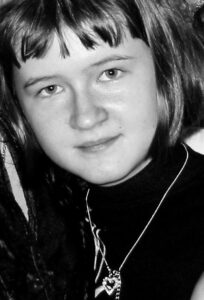Lessons of History
An unlooked-for benefit of moving house was in being able to meet Sophia at all stages of her life: infant, toddler, child, adolescent, young woman, there she was in a host of small and memorable items.
One of them is a poem, Cassandra, which was written when she was 12, and for which she won a national competition run by Amnesty International. It reflects her love of history and her growing knowledge of the ancient world (particularly her reading of Homer); but it also reflects an acute awareness of the brokenness–the ongoing human brokenness–of our times
Cassandra puts in mind the (Visions of) Apocalypse poem (click here) that Sophia wrote in the last year of her life.
“Blood is ever our argument,” she says in Visions—which, of course, is no argument at all.
Does this lesson from history never get learnt?
This child, this mere child, could see quite clearly what the stakes involved in war are. Do we?

Cassandra
“Kill the men and take their wives
as slaves.”
How many more must be herded away
before our unseeing eyes?
Never a mourning tear for those snatched
when they are dispatched by the thrust of a sword,
or gun,
or weapon.
How many more Cassandras must
be killed/tortured/maimed
before we notice,
these are the spoils of war?
Who buries Cassandra? Who laments her fall?
Who would cut a lock for the dead seer?
None but the brutal Agamemnon receives the funeral rites;
he who killed his eldest daughter for a worthless shell;
“How brave was he, how valiant.”
Great songs are sung and
retribution comes on his destroyers!
Who remembers Cassandra,
some mad slave girl!
Spoil of a war for nothing.
Who remembers she lived, breathed and cried?
She was an afterthought.
No words for Cassandra.
By Sophia Nugent-Siegal

The seer and the seen : prescient
Sophie was fully aware too of the other dimension of Cassandra’s story–that she was destined by the gods to see clearly but not be believed.
And here we are, this age of ours, in all our folly, busy not listening…meanwhile history comes round again–this monumental and terrifying moment–to a soundtrack of dancing soldier videos.
So many Cassandras in our history! Soph’s poem is spot on!
So many Cassandras, and so many unheeding civilisations…but none have had our era’s potential for devastation.